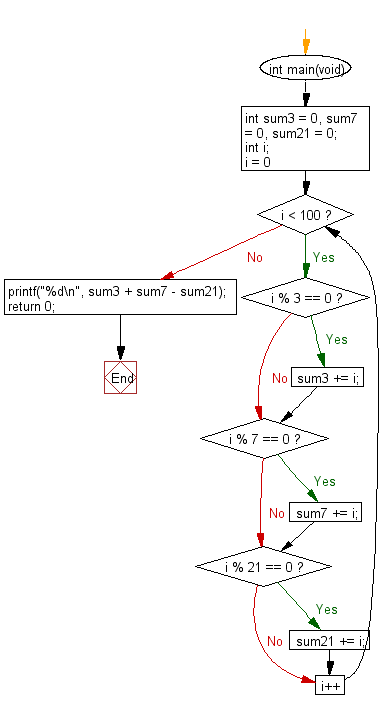C Exercises: Find the sum of all the multiples of 3 or 7 below 100
C Programming Practice: Exercise-17 with Solution
The natural numbers below 10 that are multiples of 3 or 7 are 3, 7, 6 and 9. The sum of these multiples is 25.
Write a C programming to find the sum of all the multiples of 3 or 7 below 100.
C Code:
#include <stdio.h>
int main(void)
{
int sum3 = 0, sum7 = 0, sum21 = 0;
int i;
for (i = 0; i < 100; i++) {
if (i % 3 == 0) {
sum3 += i;
}
if (i % 7 == 0) {
sum7 += i;
}
if (i % 21 == 0) {
sum21 += i;
}
}
printf("%d\n", sum3 + sum7 - sum21);
return 0;
}
Sample Output:
2208
Flowchart:

C Programming Code Editor:
Contribute your code and comments through Disqus.
Previous: Write a C programming to find the length of the longest valid (correct-formed) parentheses substring of a given string.
Next: Write a C programming to find the sum of the even-valued terms from the terms in the Fibonacci sequence whose values do not exceed one million.
What is the difficulty level of this exercise?
Test your Programming skills with w3resource's quiz.
C Programming: Tips of the Day
Static variable inside of a function in C
The scope of variable is where the variable name can be seen. Here, x is visible only inside function foo().
The lifetime of a variable is the period over which it exists. If x were defined without the keyword static, the lifetime would be from the entry into foo() to the return from foo(); so it would be re-initialized to 5 on every call.
The keyword static acts to extend the lifetime of a variable to the lifetime of the programme; e.g. initialization occurs once and once only and then the variable retains its value - whatever it has come to be - over all future calls to foo().
Ref : https://bit.ly/3fOq7XP
- New Content published on w3resource:
- HTML-CSS Practical: Exercises, Practice, Solution
- Java Regular Expression: Exercises, Practice, Solution
- Scala Programming Exercises, Practice, Solution
- Python Itertools exercises
- Python Numpy exercises
- Python GeoPy Package exercises
- Python Pandas exercises
- Python nltk exercises
- Python BeautifulSoup exercises
- Form Template
- Composer - PHP Package Manager
- PHPUnit - PHP Testing
- Laravel - PHP Framework
- Angular - JavaScript Framework
- Vue - JavaScript Framework
- Jest - JavaScript Testing Framework
